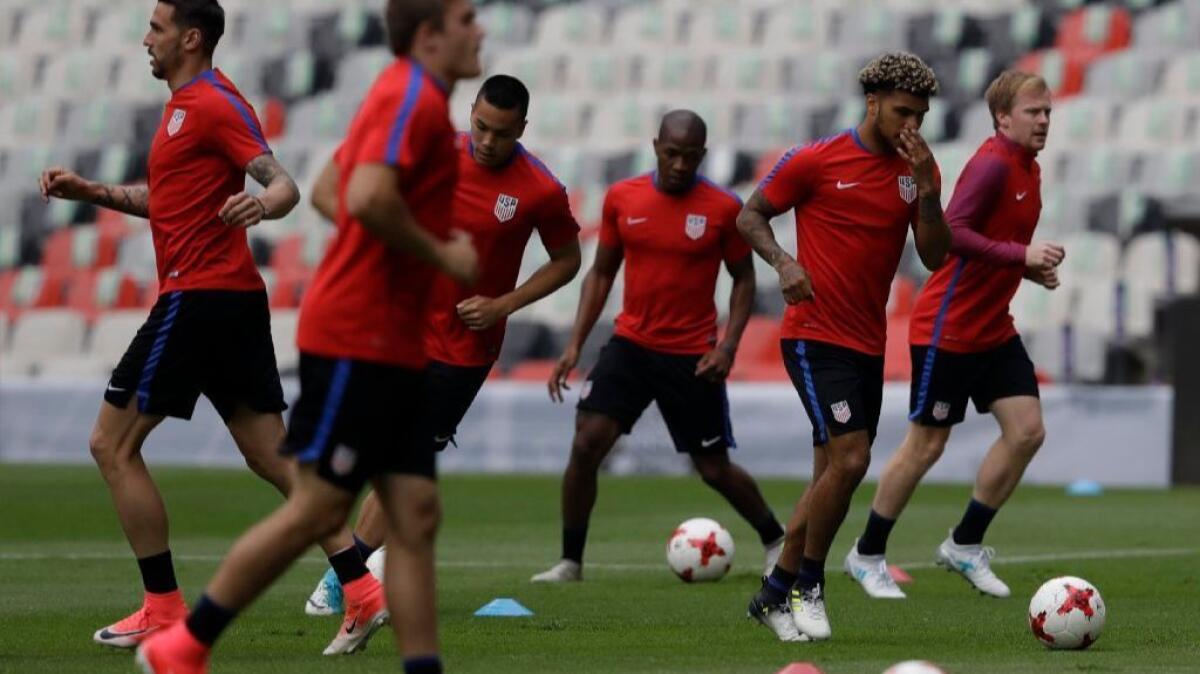Column: U.S. players will represent their country, not their president, when they play Mexico
- Share via
Reporting from MEXICO CITY — Bruce Arena, the head coach of the United States national soccer team, wanted to make something clear.
When his team takes the field against Mexico at Azteca Stadium on Sunday, it will be representing the United States. It won’t be representing its president.
It’s a strange time to be an American, especially an American abroad. And with the U.S. playing in Mexico for the first time since Donald Trump was elected president, Arena was doing the same awkward dance many of us do these days when speaking to foreigners or visiting another country, explaining how the views and policies of the administration might not reflect your own.
“We have the greatest respect for Mexico, its people, its football team,” the former Galaxy coach said. “I live in Los Angeles. I experience, on a daily basis, people of Mexican heritage. They’re wonderful people, they contribute greatly to our society in many ways. We think the world of them.
“I’m ashamed that there’s perhaps some discord on the political side, but, believe me, I think most Americans appreciate the Mexicans that have come to America to make a better future for themselves and their families and the way they have contributed.”
His words are unlikely to diminish the amount of abuse his players will receive Sunday.
Trump insulted Mexico and its people on the campaign trail. The close to 100,000 people that will pack the Azteca on Sunday can’t voice their displeasure directly to him. The closest they can come to doing so is by hurling insults and who-knows-what-else at the U.S. soccer team.
The irony is that there is no collection of American athletes that less represents the ideals of the Trump administration. The roster is a reflection of our country’s multiculturalism that was rejected by Trump voters. Several players have spoken out against Trump, perhaps none more so than captain Michael Bradley, the Caucasian son of a Princeton-educated coach.

Midfielder Darlington Nagbe laughed uncomfortably when told of how the fans will view him and his teammates as proxies for the White House.
“I think that we know it comes with it, you know?” Nagbe said. “It’s a tough position to be in.”
Asked about Trump’s call to build a wall along the U.S.-Mexico border, Nagbe replied, “I don’t think it’s right, you know? Me being from another country …”
He spoke of his background, how he was born in war-torn Liberia and moved to Sierra Leone as a refugee before settling in Ohio. Nagbe is one of three naturalized citizens on the team. Defender John Brooks and midfielder Fabian Johnson were born in Germany.
Defender Jorge Villafana was born in Anaheim but raised in Mexico. Several players are sons of immigrants.
The team has Anglos, Latinos and African Americans. Forward Bobby Wood and midfielder Kellyn Acosta are part Japanese.
Ten players on the team earn their living in other countries on worker’s visas.
“That’s the great thing about sports,” Nagbe said. “You get to bring a group of people together and try to get a result for the country.”
Mexican fans won’t view the players the way the players view themselves. Mexico coach Juan Carlos Osorio spoke to reporters Saturday about the obligation his team had to deliver a victory for Mexican immigrants living in the United States.
Osorio was born in Colombia but has significant ties to the United States. He received a college education in the United States. He had multiple coaching positions in Major League Soccer. His children are Americans citizens.
Osorio revealed there was a time when he was in the United States as an undocumented immigrant. He said he relates to Mexicans in similar circumstances, to the conflicting feelings of gratitude toward the United States but wanting to win when competing against Americans.
Nagbe was modest in how he thought his team could affect the perception of Mexican fans.
“I think we want to show we’re good players and we’re a good team,” he said.
In other words, they should worry about the game. They can’t control anything else.
Or, as goalkeeper Tim Howard said, “When guys are beating down on you, Donald Trump is the last thing on your mind.”
Follow Dylan Hernandez on Twitter @dylanohernandez
More to Read
Go beyond the scoreboard
Get the latest on L.A.'s teams in the daily Sports Report newsletter.
You may occasionally receive promotional content from the Los Angeles Times.







